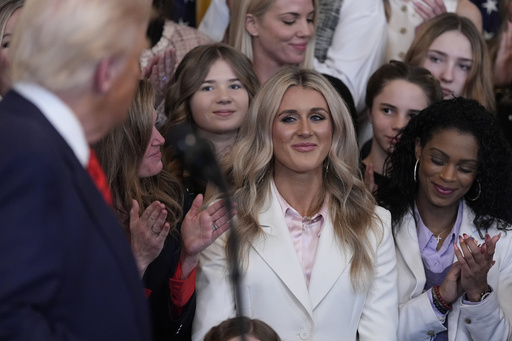The NCAA has revised its participation guidelines for transgender athletes, announcing that only individuals assigned female at birth will be allowed to compete in women’s sports. This policy change was implemented shortly after President Trump signed an executive order aimed at prohibiting transgender athletes from participating in women’s sports, stating that federal funding could be withheld from institutions failing to comply with the administration’s interpretation of Title IX, which views sex based on birth assignment.
Effective immediately, this policy impacts all NCAA athletes, overriding any previous eligibility discussions. The NCAA, which encompasses approximately 1,100 member institutions and over half a million athletes, remains the largest governing athletic body in the United States. NCAA President Charlie Baker expressed that having consistent eligibility standards will benefit today’s student-athletes more than the current mixed state laws and judicial rulings. He also emphasized that President Trump’s order establishes a clear national standard for the matter.
The decision has been met with approval from former Kentucky swimmer Riley Gaines, who is a prominent advocate for restricting transgender athletes from women’s competitions. Gaines attended the signing ceremony at the White House and was part of a group of college athletes who previously filed a lawsuit against the NCAA, claiming that their Title IX rights were violated when transgender swimmer Lia Thomas participated in national championships last year. After the NCAA’s announcement, Gaines shared on social media her sense of vindication, stating that no other female athletes would face the challenges she and her teammates did.
The previous policy allowed a sport-specific framework, determining eligibility based on the respective sport’s governing body. If there was no national regulatory body, the rules set by international federations would apply, with the IOC’s criteria taking precedence in the absence of both. Over the last year, transgender athletes have faced scrutiny, with critics arguing their inclusion in women’s sports poses unfair advantages and potential safety concerns. This issue has gained significant traction in Trump’s re-election campaign. Despite the attention, the number of transgender athletes in NCAA appears to be quite low, as Baker mentioned there were only about ten.
Under the new NCAA policy, athletes assigned male at birth are permitted to practice with women’s teams and access benefits such as medical care. It’s a common practice for women’s basketball squads to train with male students. However, an athlete assigned female at birth who starts hormone therapy may train with a women’s team but cannot participate in competitions without jeopardizing the team’s eligibility for championships. Certification of athlete eligibility for both practices and competitions remains the responsibility of member schools, and these institutions must adhere to local, state, and federal laws that take precedence over NCAA rules.
The announcement of the NCAA’s revised policy came soon after the Trump administration initiated investigations into possible civil rights breaches at several institutions and a high school sports league that allowed transgender participation in women’s events. Institutions in question include San Jose State University, the University of Pennsylvania, and the Massachusetts Interscholastic Athletic Association. Notably, San Jose State’s women’s volleyball roster brought media attention for unverified claims about the presence of a transgender athlete. That said, three former teammates of Thomas have filed a lawsuit addressing her participation in NCAA events, alleging violations of Title IX.
Sia Liilii, the captain of the Nevada volleyball team, expressed her delight regarding the new policy, stating that women have fought extensively for equal opportunities in sports. She articulated that by excluding men from women’s sports, the NCAA is adhering more closely to the principles of Title IX, enabling women to demonstrate their capabilities in a fair competitive environment.
In addition to this policy change, the NCAA’s Board of Governors has tasked staff with supporting member institutions in nurturing respectful and inclusive athletic cultures. This update accompanies recent modifications to mental health guidance. Baker highlighted that this updated policy is in line with the NCAA’s commitment to fostering intercollegiate athletic competition while safeguarding and promoting both the mental and physical well-being of student-athletes. He noted that this national standard offers vital clarity while modernizing college athletics for the current generation.
The newly revised NCAA guidelines are now in sync with the policies of the National Association of Intercollegiate Athletics (NAIA), which governs sports across 241 smaller colleges nationwide. Last April, the NAIA unanimously adopted a rule stating that only athletes assigned female at birth who have not commenced hormone therapy can participate in women’s competitions.
